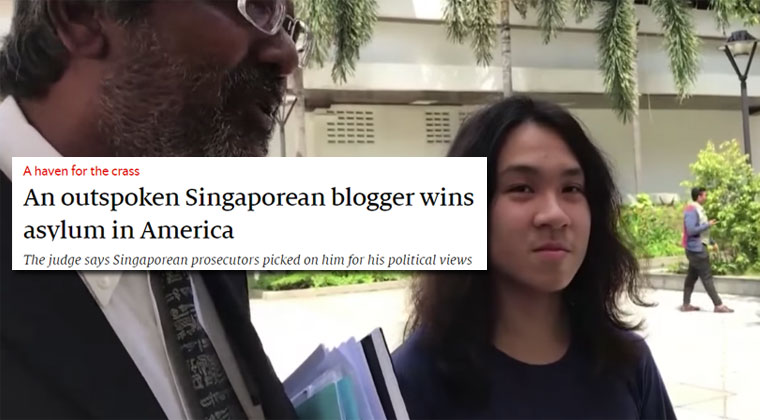The Economist has come up with another article, this time about Amos Yee.
This comes less than a month after Singapore’s High Commissioner to the United Kingdom issued a rebuttal to a previous Economist article that called on the Singapore government to make criticism more legal by not penalising those who speak out.
This latest piece, which is more tightly written, is a quick rundown of the 18-year-old Singaporean's successful asylum bid in the United States.
From the article, one can learn that the immigration judge looking into Yee's case took time out to craft a verbose response when it wasn't entirely necessary:
"Immigration judges often grant asylum with a simple, spoken ruling. This one explained himself over 13 pages."
This is followed by two valid points:
1. Singapore is incorrect to characterise Yee's successful asylum bid as America's acceptance of hate speech:
In a huffy response, Singapore’s government noted America “allows…hate speech under the rubric of freedom of speech”, whereas Singapore does not. “It is the prerogative of the US to take in such people,” it conceded, as if Mr Yee had received asylum because of the content of his speech rather than the authorities’ reaction to it.
2. The head of Singapore’s association of criminal lawyers calling the United States judge’s findings “baseless and unwarranted” is ironic.
The head of Singapore’s association of criminal lawyers said his members were “outraged” by the judge’s “baseless and unwarranted” findings. Saying such things about a ruling of a Singaporean court, ironically, could put the speaker at risk of prosecution for contempt.
Will Singapore’s High Commissioner to the United Kingdom, Foo Chi Hsia, issue another spirited rebuttal to the UK-based weekly again?
Stay tuned to find out.
[related_story]
Related article:
If you like what you read, follow us on Facebook, Instagram, Twitter and Telegram to get the latest updates.
